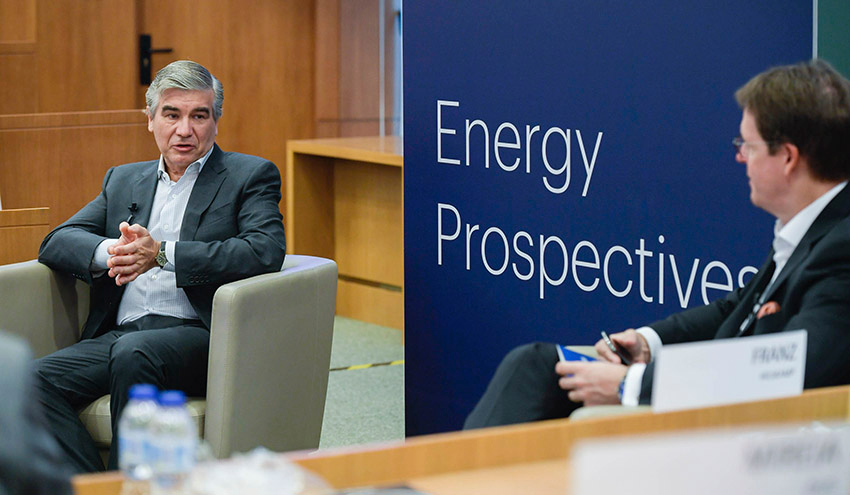Christophe Brognaux (BCG): “Energy efficiency must be a priority for addressing the climate change challenge”
Today, the global head of energy at Boston Consulting Group appeared hopeful of the possibility of achieving the emissions reduction targets, and called for the business world to adapt and for government bodies to collaborate.

Today, the managing director and senior partner of Boston Consulting Group (BCG) and global head of the generation, renewables and utilities sectors, Christophe Brognaux, and the specialist in economic policy and found of the consultancy QED Economics, Eva Valle, took part in the fourth edition of the Energy Prospectives conferences organised by the Naturgy Foundation and IESE Business School, which were opened by the chairman of Naturgy, Francisco Reynés.
“At Naturgy, we are tackling the energy transition with commitment and realism in all investment decisions,” said Reynés. “The great challenge of the industry is to undergo a realistic energy transition,” and that is why “we need regulatory and legal stability”. “A transition can be a fairly long process and there must be clear rules of play,” continued Reynés.
In the situation following the pandemic, “in which both industries and individuals must play an active role in recovery, the energy transition can and must drive this recuperation,” Reynés maintained. That is why, alongside the State, “companies must play their part with investment and employment.”
Hydrogen, energy of the future
In his speech, Brognaux affirmed that “if we want to address climate challenge, we need all sorts of technology, but if I had to prioritise, I would focus on energy efficiency, an area in which we are not currently doing enough.”
The senior partner of BCG also seemed convinced that “hydrogen will be the clean synthetic energy of the future.” “We need it for transport, industry and to balance the electricity system,” he said, adding that “If Europe has green hydrogen infrastructure, it will be competitive, but the journey will be long and risky.”
Brognaux continued: “In the last 10 years, the costs of different energy technologies has dropped: wind power decreased by 40%, offshore wind power by 75%, solar by 80%, and energy storage in batteries by 70%.”
The expert stated that we already have technological solutions to reduce the environmental impact of the energy sector and industrial activities through energy efficiency and by replacing fuels; of agriculture by efficiently using land and fertilisers; of transport thanks to electrification, more efficient engines and new fuels; and of construction through energy efficiency.
With regard to new policies and regulations, he said that “demanding standards will be set for the different products and construction, recycling will be obligatory, and cross-border CO2 tariffs will be retained, but we will also have assistance and collaboration from government bodies.”
Brognaux recalled that in order to address the energy transition, increased investments with a long-term return will remain essential, and conditions must be created to enable these investments, “in particular stability in policies and long-term regulations”, to ensure they are not an obstacle.
In light of this scenario, he called companies to action. “They must stay one step ahead of the growing importance of sustainability, carry out an exhaustive review of the assets, keep an eye out for new business opportunities and prepare for inevitable uncertainty.” “Those who are at the vanguard will prosper,” claimed Brognaux.
Evolution of the Spanish electricity market in the next decade
Valle spoke about the outlook for the Spanish electricity market over the next 10 years. “The generation mix and the evolution of prices in the wholesale electricity market will depend on the new climate commitments made by Spain regarding the penetration of renewables, greenhouse gas emissions, energy efficiency and interconnection, as well as CO2 and gas prices, and technological evolution.” In this respect, she noted that Spain has made some “ambitious commitments, far above the Commission’s calculations for Spain”.
In this scenario, Valle stated that “renewable energy, particularly solar and wind power, will replace other sources of power generation,” following the closure of nuclear power plants and the residual role of coal. “Considering that 70% of power will be generated using renewable sources in 2030, and with a more conservative scenario in terms of electricity demand and the development of storage and interconnections, surpluses of renewable energy generated will be much higher.” Valle also believes that the “main obstacles for the installation of renewables will be network access points and land acquisitions.”
Moreover, she thinks that, during this whole period, combined cycle gas plants will play a key role in supporting the system. “Gas will cease to be the main generation source in the first half of the decade. From 2026, the closure of nuclear power plants and the increase of interconnection with France will lead to a recovery of its use in generation,” explained Valle.
Meanwhile, the dean of IESE, Franz Heukamp, recalled that the world of energy is “very complex, interesting and relevant, and has a very important economic component for both countries and individuals,” hence the importance of this type of discussion organised by the Naturgy Foundation together with IESE Business School.
The chairman of the Naturgy Foundation, Rafael Villaseca, who closed the conference, called for “sustainable energy companies” in light of the “enormous challenge of competition and profitability" posed by the energy transition.
Energy Prospectives is a series of conversations that brings together figures of recognised international standing due to their experience, vision and knowledge of the energy sector, as well as business leaders, regulators, executives and academics. This initiative is one the Naturgy Foundation's activities related to energy and the environment. Through serious and in-depth discussions, the main aim is to promote the rational use of energy resources and encourage sustainable development.
Share